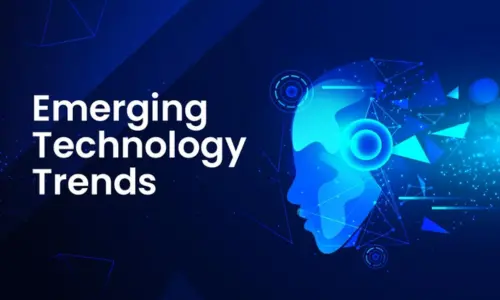Top 10 Emerging Technologies to Watch in the Next Decade
The next decade is set to be a transformative period, as new technologies emerge that will change the way we live, work, and interact with the world around us. From artificial intelligence to biotechnology, the advancements in technology will redefine entire industries, enhance human capabilities, and solve some of the most complex challenges facing society today. In this article, we’ll explore the top 10 emerging technologies to watch in the next decade and discuss their potential impact.
1. Artificial General Intelligence (AGI)
1.1 What is AGI?
Artificial General Intelligence (AGI) refers to AI systems that possess the ability to understand, learn, and apply intelligence across a wide range of tasks, just like a human. Unlike current AI models, which are designed for specific tasks (narrow AI), AGI would be capable of general problem-solving and reasoning in unpredictable scenarios.
1.2 Potential Impact of AGI
The development of AGI would represent a massive leap forward in AI technology. Once achieved, AGI could revolutionize industries such as healthcare, finance, and education by automating complex tasks that currently require human intervention. AGI could accelerate discoveries in science and medicine, but it also raises ethical concerns about job displacement, data privacy, and the potential misuse of such technology.
2. Biotechnology and Gene Editing
2.1 The Rise of CRISPR
In the coming decade, biotechnology will continue to advance, with a particular focus on gene editing. CRISPR-Cas9, a tool that allows scientists to precisely edit DNA, has already shown remarkable promise in curing genetic diseases. However, future advancements will extend beyond medicine.
2.2 Beyond Healthcare: Agriculture and Biofuels
Gene editing can also be applied to agriculture, enabling the creation of genetically modified crops that are more resistant to pests, diseases, and climate change. Additionally, breakthroughs in biofuels through genetic engineering could lead to more sustainable energy solutions, reducing our reliance on fossil fuels.
3. Quantum Computing
3.1 What is Quantum Computing?
Quantum computing harnesses the strange properties of quantum mechanics to process information in ways that traditional computers cannot. While classical computers use bits (0s and 1s) to perform calculations, quantum computers use qubits, which can represent multiple states simultaneously. This enables quantum computers to solve complex problems much faster than classical machines.
3.2 Quantum Computing’s Impact on Industries
In the next decade, quantum computing is expected to solve problems that are currently unsolvable, particularly in fields like cryptography, materials science, and pharmaceuticals. For example, it could help develop new drugs faster by simulating molecular interactions or create secure encryption methods that protect sensitive data.
4. Next-Generation Batteries
4.1 The Need for Better Energy Storage
As the world transitions to renewable energy, the need for efficient energy storage solutions has become paramount. Current lithium-ion batteries have limitations, such as energy density, longevity, and environmental impact.
4.2 Solid-State and Metal-Air Batteries
Next-generation batteries, such as solid-state batteries and metal-air batteries, offer promising solutions. Solid-state batteries use a solid electrolyte instead of a liquid one, which increases energy density and safety. Metal-air batteries, on the other hand, use oxygen from the air to generate power, making them lightweight and energy-efficient. These advancements could revolutionize electric vehicles, energy storage for renewables, and even consumer electronics.
5. 5G and 6G Networks
5.1 The 5G Revolution
5G networks are already rolling out across the globe, offering faster speeds, lower latency, and greater connectivity than ever before. But 5G is just the beginning of a new era of hyperconnectivity. Over the next decade, 5G will enable transformative technologies like autonomous vehicles, smart cities, and advanced IoT (Internet of Things) ecosystems.
5.2 What to Expect from 6G
Looking further into the future, 6G networks are expected to launch by the end of the next decade. These networks will offer even faster data speeds—potentially 100 times faster than 5G—allowing for seamless integration of virtual reality (VR), augmented reality (AR), and other immersive technologies into everyday life. Additionally, 6G could enable holographic communication and expand the capabilities of AI in real-time applications.
6. Augmented Reality (AR) and Virtual Reality (VR)
6.1 The Evolution of Immersive Technologies
Augmented Reality (AR) and Virtual Reality (VR) technologies are poised to grow significantly over the next decade. While VR immerses users in completely virtual environments, AR overlays digital information onto the real world. Together, these technologies are becoming more advanced, accessible, and practical.
6.2 Applications Beyond Gaming
While AR and VR have gained popularity in the gaming industry, they are now expanding into education, healthcare, and remote work. In the next decade, AR glasses could replace smartphones, allowing users to interact with digital content hands-free. VR could revolutionize education by offering immersive learning experiences, while AR is expected to play a key role in industries like manufacturing and medicine, where real-time data visualization can enhance decision-making and productivity.
7. Autonomous Vehicles and Mobility
7.1 Self-Driving Cars: The Future of Transportation
Autonomous vehicles have been in development for years, but the next decade is expected to bring fully self-driving cars to mainstream use. Companies like Tesla, Waymo, and traditional automakers are investing heavily in autonomous driving technologies that can navigate complex environments without human intervention.
7.2 Impact on Urban Mobility
Beyond personal cars, autonomous technology will transform urban mobility. Autonomous buses, taxis, and delivery services could reduce traffic congestion, lower accident rates, and decrease pollution by optimizing routes and improving fuel efficiency. In the long term, autonomous transportation could reduce the need for car ownership, particularly in cities, paving the way for a more sustainable future.
8. Nanotechnology
8.1 The Power of Small Things
While the field has already led to breakthroughs in areas like materials science and medicine, the next decade will see nanotechnology unlock new possibilities.
8.2 Applications in Medicine and Electronics
In medicine, nanotechnology will enable targeted drug delivery systems, allowing treatments to reach diseased cells with pinpoint accuracy, reducing side effects and increasing effectiveness. In electronics, nanomaterials could lead to the creation of smaller, faster, and more energy-efficient components for everything from smartphones to supercomputers.
9. Biometrics and Digital Identity
9.1 A New Era of Security
The next decade will see a shift towards more secure, biometric-based authentication methods. Traditional passwords are becoming outdated and increasingly vulnerable to cyberattacks. Biometric technologies, such as facial recognition, fingerprint scanning, and even DNA-based identification, will become more widespread as a means of securing digital identities.
9.2 Ethical and Privacy Concerns
While biometrics offer enhanced security, they also raise ethical and privacy concerns. As companies and governments collect more biometric data, questions about surveillance, consent, and data protection will need to be addressed.
10. Synthetic Biology
10.1 Redesigning Life Itself
Synthetic biology is the engineering of biological systems to create new organisms or redesign existing ones. This emerging field has the potential to revolutionize agriculture, medicine, and environmental conservation.
10.2 Applications and Future Potential
In agriculture, synthetic biology could be used to create crops that are more resistant to climate change, pests, and diseases. In healthcare, scientists are developing engineered microbes to treat diseases and create sustainable sources of food and fuel. Looking ahead, synthetic biology could even be used to create entirely new life forms designed to perform specific functions, such as cleaning up pollution or producing biofuels.
Conclusion
The next decade promises to be a period of rapid technological growth and change. From artificial intelligence to synthetic biology, these emerging technologies will reshape industries, solve global challenges, and improve the quality of life for billions of people. However, they also come with ethical, environmental, and societal challenges that must be carefully navigated. As we move forward, staying informed about these innovations will be crucial for both individuals and organizations looking to thrive in the future.







